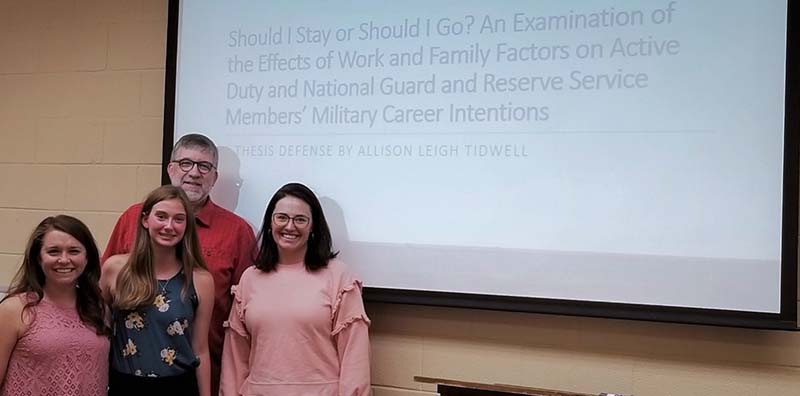15
Nov
2022
/
/
Military REACH Project Manager
It’s a time to celebrate! Allison Tidwell, Graduate Research Assistant for Military REACH,
recently defended her master’s thesis. For the past two years, she’s completed coursework towards
her master’s degree in Human Development and Family Science, and for the last year, she has
been working on her thesis titled: Should I stay or should I go? An examination of the effects
of work and family factors on active duty and National Guard and Reserve service members’
military career intentions.
Using data from the All Army Study component of the
Army Study to Assess Risk and
Resilience in Service members (Army STARRS AAS), the purpose of Allison’s study was
to explore how work-related factors, family-related factors, and mental health
contribute to a Service members’ intentions to stay in or leave the military,
and whether the contributions of these factors differed between active-duty
and National Guard or Reserve personnel.
The Department of Defense sets annual retention goals to retain a highly-trained,
ready defense force. To achieve these retention goals, it is important to examine what factors
contribute to Service members intentions to stay in or leave the military. Given the
differences in monthly time commitment to military duties between full-time,
active-duty Service members and part-time, National Guard or Reserve Service
members, factors contributing to career intentions may differ between these two groups.
Overall, this study has several implications for promoting retention among Service members:
- Unit leaders and subordinates can work to create more supportive work environments and policies that help Service members balance their work and family obligations (e.g., shorter deployments, maternity and paternity leave, remote work opportunities)
- Unit leaders can be trained to recognize signs of declining mental health and refer their unit members to appropriate health care resources.
Importantly, while some work-related factors and family-related factors were stronger
indicators of mental health and military career intentions for active-duty or National
Guard or Reserve personnel, these factors still remained important for career intentions
across both groups.
- This finding suggests limited differences in how Service members’ perceptions of their work environment, family life, and mental health contribute to intentions to remain and intentions to leave based on active-duty or National Guard or Reserve status.
Allison is graduating with her master’s degree in Human Development
and Family Science this fall. This spring, she will continue studying
military families while working towards her Ph.D. in Human Development
and Family Science.

